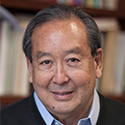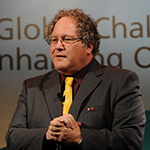
The USC U.S. - China Institute, Japan Society New York, and National Consortium for Teaching about Asia (NCTA) are offering a complimentary one-day workshop on Japan at USC for educators.
The United States and Japan have been intertwined for more than 160 years as rivals and close partners. Our alliance today is one of the most enduring and important in the world.
Presenters
Sam Yamashita, Pomona College
From the Meiji Restoration through the Pacific War
 This presentation will have three parts. The first focuses on the efforts of the Japanese government after the Meiji Restoration to transform the country from a congery of feudal kingdoms into a nation that could survive in a hostile world. The second follows Japan as it became a world power and entered into war in Asia and with the United States. The third examines the impact the Asia-Pacific War had on the lives of ordinary Japanese.
This presentation will have three parts. The first focuses on the efforts of the Japanese government after the Meiji Restoration to transform the country from a congery of feudal kingdoms into a nation that could survive in a hostile world. The second follows Japan as it became a world power and entered into war in Asia and with the United States. The third examines the impact the Asia-Pacific War had on the lives of ordinary Japanese.
Samuel Yamashita grew up in Kailua, a beach town in Hawaii, and studied history in college. A Woodrow Wilson Fellowship led to graduate work in Japanese history at the University of Michigan and a postdoctoral year at the Reischauer Institute at Harvard. He is currently the Henry E. Sheffield Professor of History at Pomona College, where he has taught since 1983. A fascination with classical languages that started with Latin in high school and continued with classical Japanese and classical Chinese in graduate school fueled his ambition to read the East Asian classics in their original languages and inspired two decades of research on Confucian intellectuals in China, Japan and Korea. In the 1990s a search for the voices of ordinary Japanese during the Asia-Pacific War led to his amassing a collection of over two hundred and fifty diaries and memoirs that he used to write Daily Life in Wartime Japan, 1940-1945 (University Press of Kansas, 2015). Translations of eight of these diaries were published as Leaves from an Autumn of Emergencies: Selections from the Wartime Diaries of Ordinary Japanese (University of Hawai‘i Press, 2005).
Lynne Miyake, Pomona College
Nationhood, Experimentation, and Nationalism: Meiji, Taishô, and Early Shôwa Literature

Higuchi Ichiyo marks the rapid Meiji political, economic, and social changes by nostalgically viewing the past, while in Kokoro Natsume Sôseki examines their personal and national costs. The Taishô period heralds new approaches: the confessional “I-novel,” Tamura Toshiko and other women writers, and Akutagwa Ryûnosuke’s “In a Grove” which boldly questions what constitutes truth. The early Shôwa brings much: women writers like Hayashi Fumiko and proletarian writers Miyamoto Yuriko, and Sata Ineko. Nobel Prize winner Kawabata Yasunari debuts with “Izu Dancer;” Tanizaki Jun’ichirô “hides out” during the war, translating The Tale of Genji and composing The Makioka Sisters. Pressed into service to support the war effort, writers produce very little. It is only later that Fires on the Plain and Black Rain speak to the travesties of war.
Lynne Miyake’s background is in classical Japanese literature, and she works extensively in the narrative prose and diary literature traditions of the 10th through 12th centuries. In particular, she examines the different narrative strategies employed by authors, narrators and readers in the creation of the textual experience. She also looks at how gender is configured through the various players. Recently, her studies have included the intersection between contemporary authors, scholars and filmmakers and classical Japanese literature.
Clayton Dube, USC
Sources and Activities for Teaching about Japan

Clay Dube and the institute are focused on informing public discussion about the importance and evolving nature of U.S.-China relations. Dube teaches Chinese history and studies the role of the media in U.S.-China relations.
QUESTIONS? CONTACT asiak12@usc.edu or 213-821-4382
SPONSORED BY

with financial support from an anonymous donor and the Freeman Foundation.


